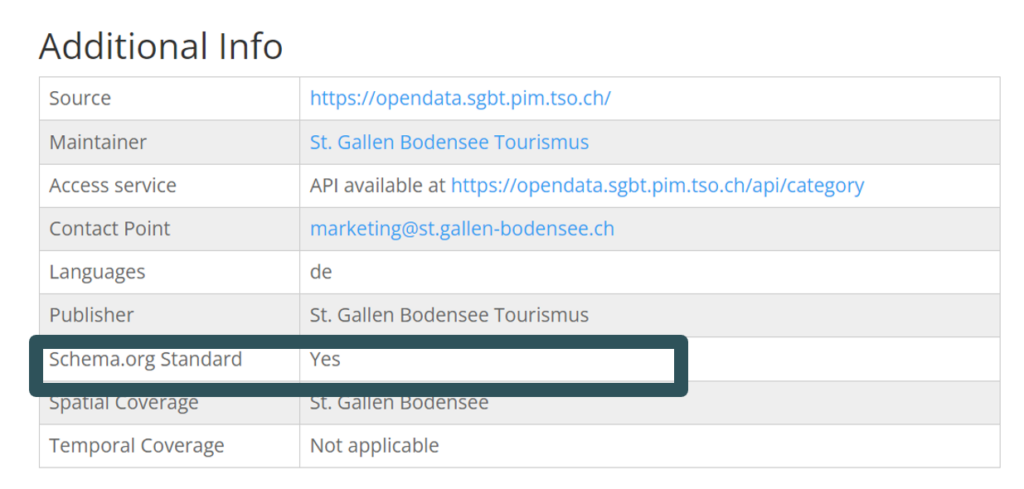Data standards play a pivotal role in ensuring interoperability, seamless communication across diverse platforms and machine readability. As we navigate the vast volume of data in tourism, it becomes increasingly important to understand why data standards are not just a technical nicety but an essential element of our information ecosystem. In this blog post, we delve into the topic and try to answer a fundamental question: Why are data standards so important? We present schema.org standard and describe its use in the tourism context.
What is schema.org?
Schema.org is a project that was initiated by the largest search engines. The initiative was formally launched in 2011 by three companies: Google, Microsoft, and Yahoo, who were later joined by Yandex.
Schema.org is a collaborative, community activity with a mission to create, maintain, and promote schemas for structured data on the Internet, on web pages, in email messages, and beyond. Schema.org can be defined as markup (also known as structured data) is a code standard used to help search engines understand and categorize webpage content. For several years now, schema.org has been playing an increasingly important role in search results.
The website Schema.org provides a central place for the documentation of the ontology, along with examples of usage. Over 10 million sites use Schema.org to markup their web pages and email messages.
Types and categories in schema.org markup
At the time of writing this post (December 2023), the ontology contains 803 types (classes) and 1466 unique properties. The vocabulary contains classes to describe the most popular types of Web content, including events, movie reviews, business listings, product offers, and more.
The figure below presents part of the documentation of the Accommodation class (https://www.schema.org/Accommodation).

On the above figure, the schema.org markup for “Accommodation” is presented. It contains definition of the Accommodation type at schema.org. The page lists some of the valid attributes of an accommodation, their meaning, and expected value
At first, Accommodation as class is clearly defined: “An accommodation is a place that can accommodate human beings, e.g. a hotel room, a camping pitch, or a meeting room. Many accommodations are for overnight stays, but this is not a mandatory requirement. For more specific types of accommodations not defined in schema.org, one can use additionalType with external vocabularies”.
After that, the list of properties is included, for example “accommodation category” or “amenity feature” and many more. We can also check what kind of information is required, for example for “accommodation category” it should be a text information, but in case of “number of full bathrooms” it should be a number.
Extensions of schema.org vocabulary for tourism
Since the initial effort to develop and merge existing schemas, the schema.org vocabulary kept evolving primarily by incorporating external contributions. In the tourism context Open Data Tourism Alliance (ODTA) brings tourism domain experts from the German-speaking countries in order to create domain-specific patterns and extensions for schema.org.
In the last years , the ODTA worked on extensions related to types such as: Events, POIs, Tourist Attractions, Trips, Offer Trail and others. Their attempts have been documented on this website: https://github.com/ODTA/ds/issues
The ODTA community worked together and discussed specifics of each type and its properties.
For example, in the discussion about POIs and possible extensions following aspects were discussed:
- Should the schema include information about smoking areas in the restaurants
- It is necessary to inform about fax number
- Should the schema include information about pets allowed, internet access, WLAN hotspots
- How to connect schemata for a POI that is on the trail
- More on https://github.com/ODTA/ds/issues/13
When the discussion is over, the ODTA prepares the documentation that is being sent to schema.org for further verification. In the next step the extension is incorporated into the schema.org ontology.
How to use schema.org in tourism
Several companies in tourism industry already use schema.org markup. Those are for example:
- Engadin Tourismus in its Content Hub Engadin
- Discover Swiss and their platform
- Zurich Tourismus in the open data platform
In our metadata catalogue we publish metadata about each dataset. There is also information about schema.org markup.

